SU Elections 2020 SUBStage Forum 1 Recap
The second forum of the election featured half of the races and some of the referendums/plebiscites
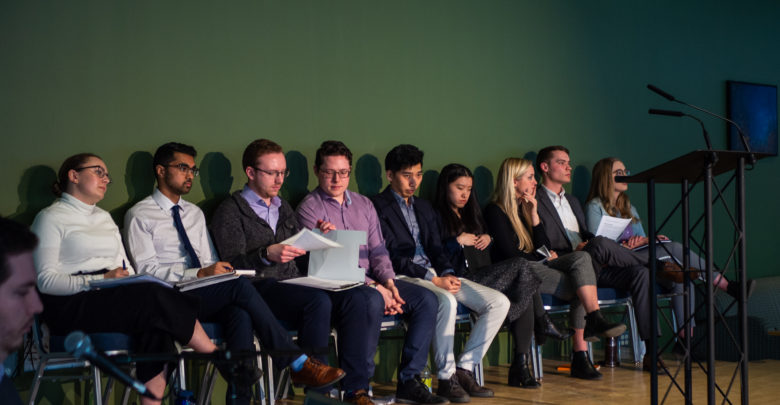 Helen Zhang
Helen ZhangThe second forum for the University of Alberta Students’ Union 2020 election saw candidates answer questions from the audience, in addition to challenge each other through debate.
Some of the highlights of what was discussed during the forum included:
- President: approaches to funding and Students’ Union involvement in local or national movements
- Vice-president (student life): free transit advocacy and sexual assault prevention and response coordinator hiring for the university
- Board of Governors representative: endowment fund use
- Sustainability and Capital Fund: broader lens of sustainability than just the proposed green fund
Presidential candidates differ on approaches to funding and student movement responses during forum
Luke Statt and Joel Agarwal asked each other what they would do to ensure mental health remains a focus of the Students’ Union.
Luke Statt, fifth-year business student and current Students’ Union vice-president (operations and finance), said keeping mental health funding is inherently tied to growing the Students’ Unions capacity.
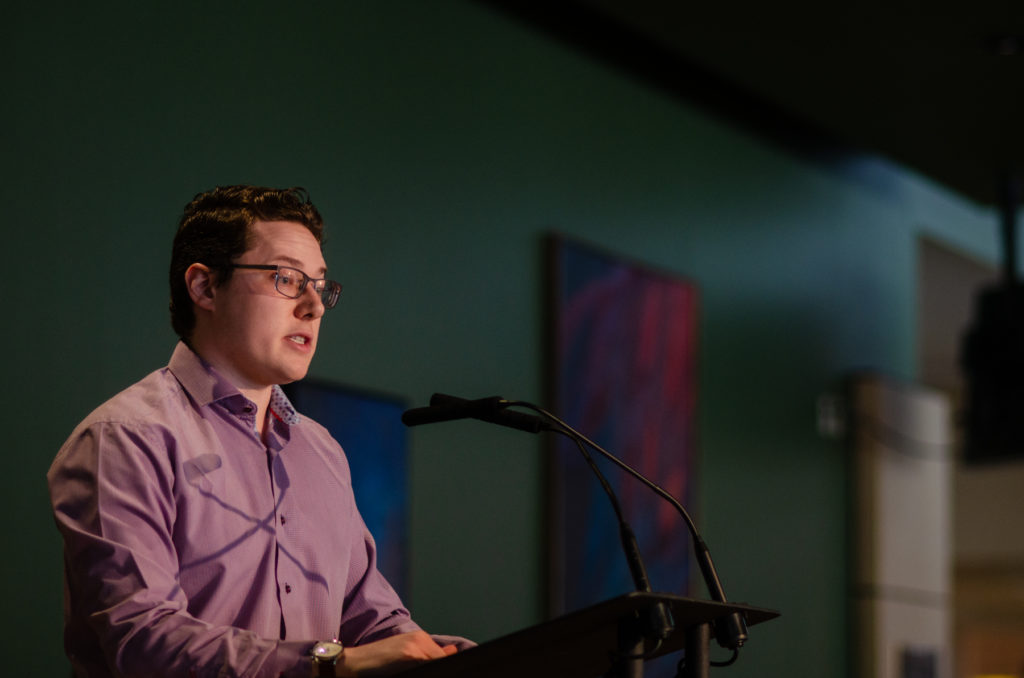
“100,000 additional dollars in [our] budget means $100,000 going back to students, no matter what’s happening with the university’s budget and no matter what the government may have at play,” Statt said.
Joel Agarwal, sixth-year biology student and current vice-president (academic), took a different approach, looking towards re-establishing provincial government mental health funding, despite being a “hard ask.” He also mentioned expanding the current Students’ Unions services to better address students.
“Financial aid is a huge component of it, but I think we also need to addressing other components,” Agarwal said. “We need to expand more cultural lenses so that… international students, Indigenous students, and students from other cultures will feel supported.
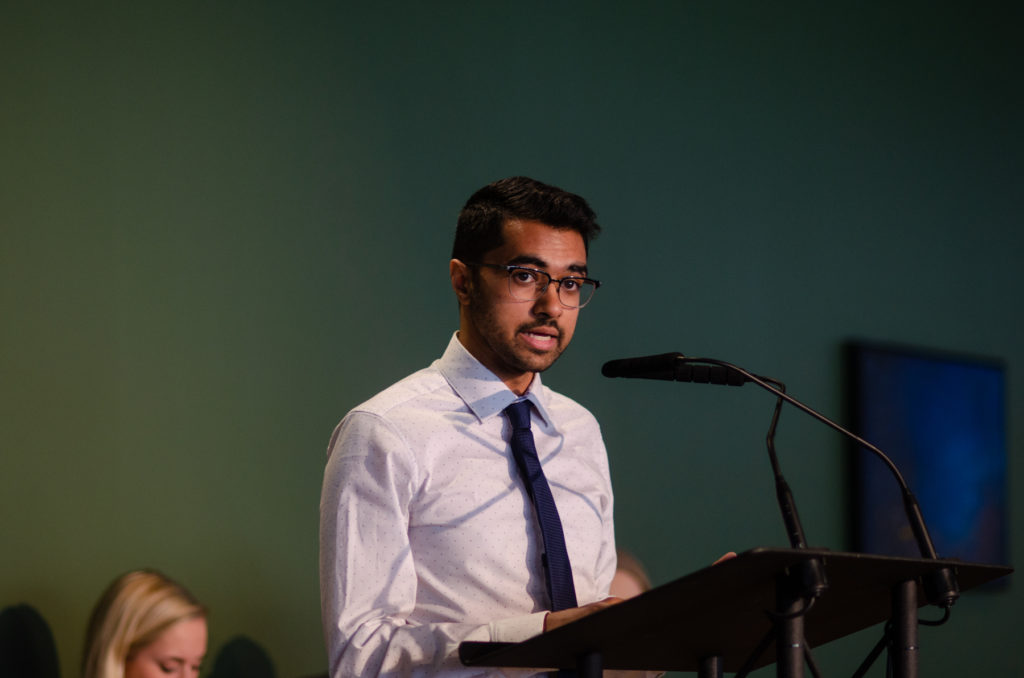
In terms of funding, Yiming Chen, third-year international student and current arts councillor on Students’ Council, had her eye on a different problem. Chen accused Statt of voting in favour to increase the Students’ Union Executive team’s salary through the executive compensation package. However, the executive compensation package made no increases to salaries of Students’ Union executives. She also said that un-educated councillors allow for these types of decisions to pass.
“Our Student’s Council are not experienced enough to make a clear decision and (the executives) did not give a clear presentation about how much the increase was from past wages,” she said. “I hope this kind of decision will be removed (from Students’ Council) in the future.”
Statt said that Students’ Union executives have received salaries “long-before” he was in office and that increases in their salaries go back to supporting Students’ Council. However, he said wants to work towards reducing Students’ Union fees.
What would you do differently?
From the audience, candidates were asked what they would do differently from current Students’ Union president Akanksha Bhatnagar.
Both Statt and Agarwal said they believe that Bhatnagar has done a wonderful job in her position. They both, however, critiqued her less than timely responses to issues facing students, such as the late response to the first provincial government budget.
“I think Akanksha was a stellar president,” Statt said. “The only reason [she didn’t respond quickly to the provincial budget] was because she was out of the country… under my presidency, the SU will give robust responses to show students we care.”
“I think Akanksha has done an incredible job as president, but there is always room to grow,” Agarwal said. “ Often students on campus don’t see the advocacy that happens. A lot of major wins that have happened… have happened through lobbying.”
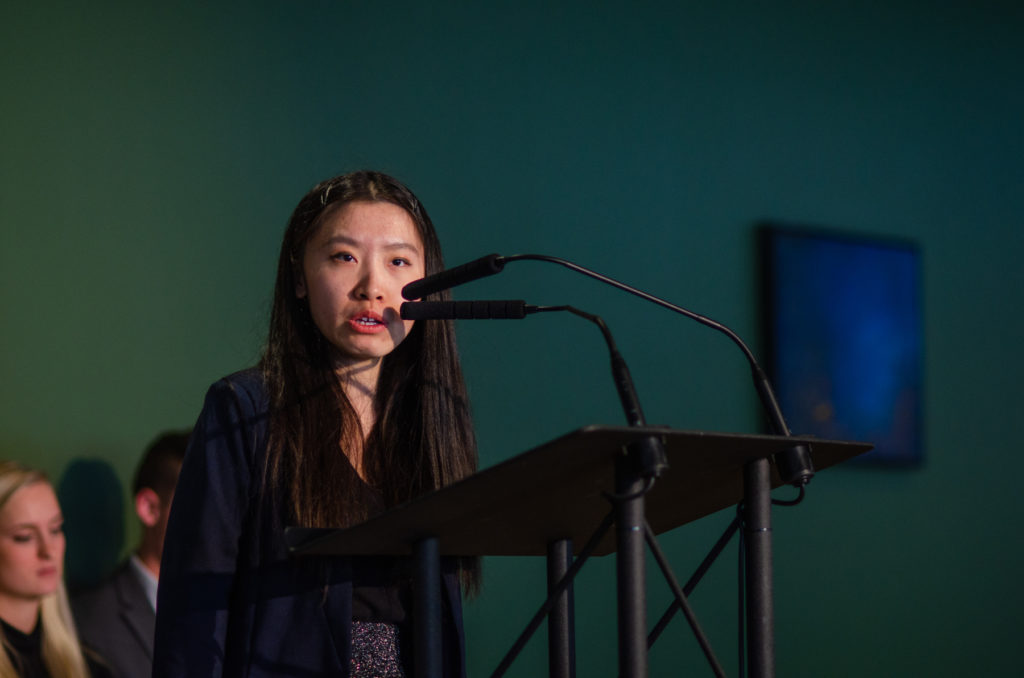
Chen said that she would focus more on centring student voices, as she feels that executives often make decisions independently. She emphasized putting the community’s voice first through creating a feedback system that would allow students to communicate with the Students’ Union more efficiently.
“When there is a problem, we go with the decisions of leaders, not our committees, not our councillors, not our people,” Chen said. “We should hear our students first.”
Fitting the Students’ Union within the national mobilization
In light of a national walk-out currently organized to support Wet’suwet’en, candidates were asked how they would respond to national calls for the mobilization of students.
Chen said the Students’ Union cannot undervalue the importance of student mobilization and committed to providing emotional support for students fighting against issues.
“Movements are a chance for people to share emotions, to find their community,” she said. “It’s very valuable for people…. to show their anger and let people know they exist. Our Students’ Union will definitely support any people who are oppressed.”
Statt promised that as president, the Students’ Union would actively be present at any protests relating to student issues. To back up this claim, Statt pointed towards the Students’ Union’s planned response to the upcoming provincial budget release.
“There is an upcoming protest this Thursday about the upcoming budget release and all the executives will be there,” Statt said. “We’ll keep that same culture into the future so that the Students’ Union is at the forefront of any issue.”
For Agarwal, supporting student mobilization goes back to the core motto of the Students’ Union: “Do what’s right, not what’s easy.”
“When we hear about injustices like this, we need to remember how nuanced this issues are and how they are affecting students,” he said. “We need to be looking into ways we can tangibly support students…. So I think this would require more discussion.”
— Khadra Ahmed
VPSL race outlines how they plan to get the university to hire a sexual assault prevention and response coordinator
The hiring of a sexual assault prevention and response coordinator and the reality of free transit were at the forefront of the vice-president (student life) race.
Katie Kidd, a fourth-year student in secondary education and Students’ Council education councillor, questioned her opponent on the inclusion of free transit in her platform, asking what would she do differently than what the position already mandates.
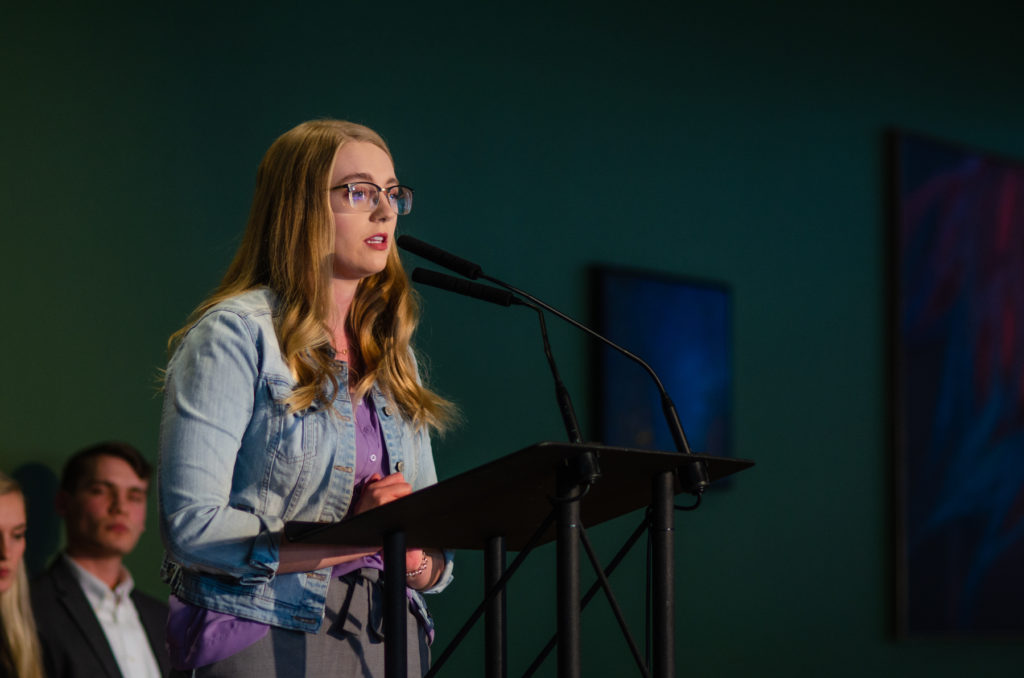
Talia Dixon, a third-year student double majoring in women’s and gender studies and political science and Students’ Council arts councillor, responded that free-transit is something she would “champion.”
Dixon asked Kidd how she would be fighting for students on the provincial level regarding the recent and impending budget cuts to university students. Kidd cited recent involvement in different student lead movements, while Dixon responded with her own experience rallying students in grassroots movements.
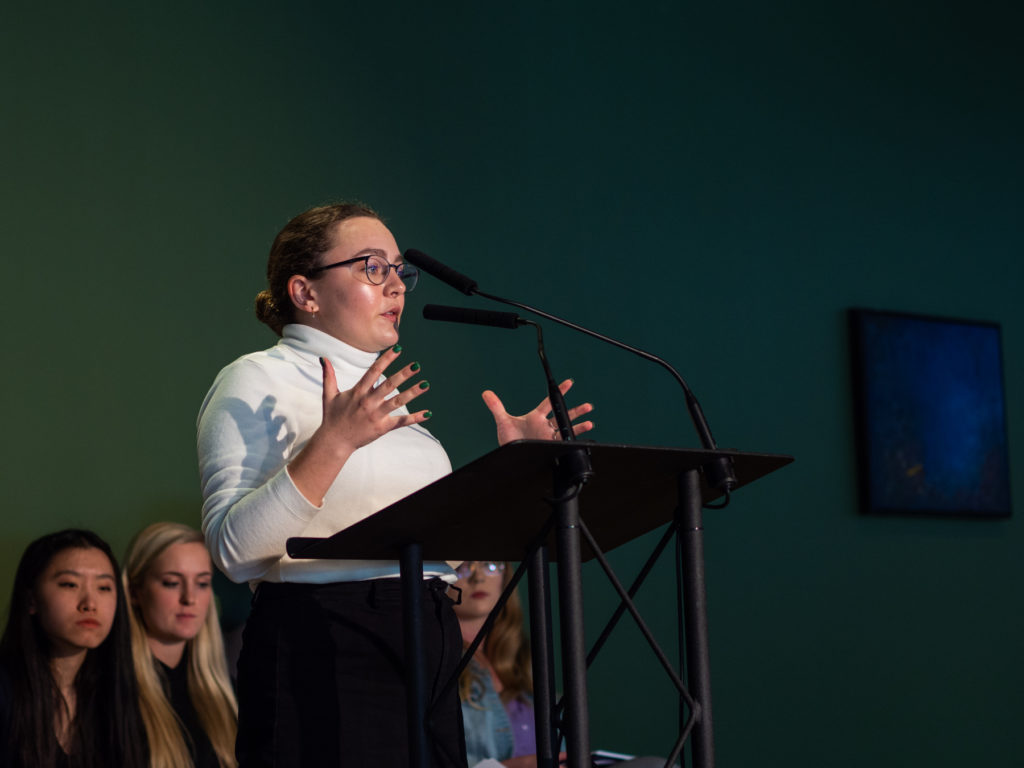
Jared Larsen, current Students’ Union vice president (student life), asked the candidates how they would go about hiring a sexual assault coordinator when past working groups and student lead movements have been unsuccessful.
“I want to start a letter-writing campaign, I think the traditional protests we have done before don’t have survivor stories at the forefront,” Kidd said. “I want to work to empower survivors to write down their stories [for] the dean of students… so he can understand the barriers they face on campus every single day.”
“I think we already have a lot of information on sexual assault both locally, nationally, and here in Alberta,” Dixon said. “Women and people who’ve affected by sexual assault cut themselves open numerous times to try and prove themselves. I think what we need to… provoke internal and external pressure on the university and if that doesn’t work… I think we should look at how we can hire this individual ourselves.”
— Haley Dang
BoG talks about board influence and endowment dollar usage
During the debate, Albert Hu, a third-year medical student, asked his competitor how he would convince the board to vote with him on policies that impact students.
Dave Konrad, second-year bachelor of environmental and conservation sciences student, said he would create a good working relationship with the board, which hasn’t always been the case in the past.
“We need to maintain a mature, calm, diplomatic disposition so that they see us as the adults we are,” he said.
Konrad would also bring evidence-based cases to the board on student issues, work with the Students’ Union department of research and advocacy, and ask the Office of Advancement to look into non-student revenue to reduce tuition.
Hu responded that he would pick his battles and focus on the top three student concerns. He also said he will translate everything into numbers for the Board of Governors.
“The Board, these people, they speak numbers and speak risk management,” he said.
The audience asked how the candidates will make sure tuition stays the same. Konrad said the “mature perspective” is to accept that tuition will increase, but it’s “key” to keep increases below seven per cent.
“Being that voice that says ‘do not increase student tuition,’” he said.
He said he will also advocate with the vice-president (external) and the board for a predictable provincial budget, and share student opinions about funding.
Hu said he wants no increase in tuition because tuition is only a fraction of the total cost of the university.
“It doesn’t make sense to increase the 15 per cent tuition to make up for the rest of the deficit, it makes no sense,” he said.
He says he has plans to address the issue with the endowment, adding that the province “is no hope,” and that the university should solve their own problems.
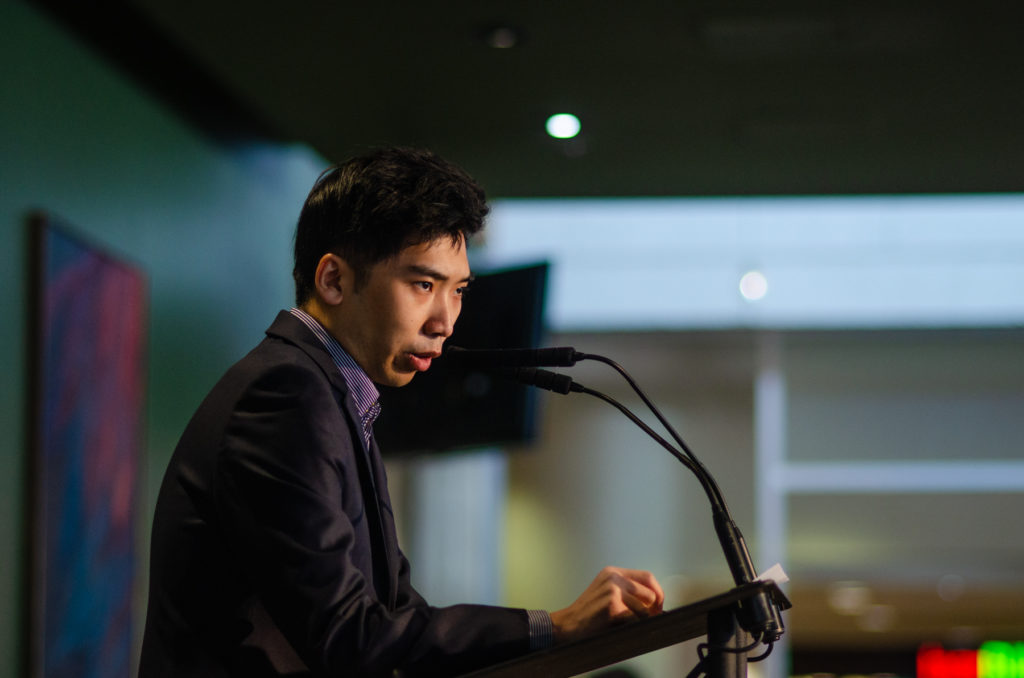
A question from the audience asked the candidates how they will convince the board to change their endowment policy, and if they think it would be wise to spend more money that is used to grow the endowment.
Endowment funds are donated to the university from external sources, and the average investment return is 9.6 per cent. In 2018, the BoG passed a policy that said that only four per cent of the endowment investment return can be spent, the remainder is reinvested in the endowment to promote fiscal growth.
Hu said he wants the university to spend the full nine per cent every year and that it’s not the right time to reinvest.
Konrad said it is good to take money for students, but doesn’t think that’s a full solution. He said he would look for money in non-student revenues, including ancillary services, working with vice-president (external) and the president for tuition requests from the province.
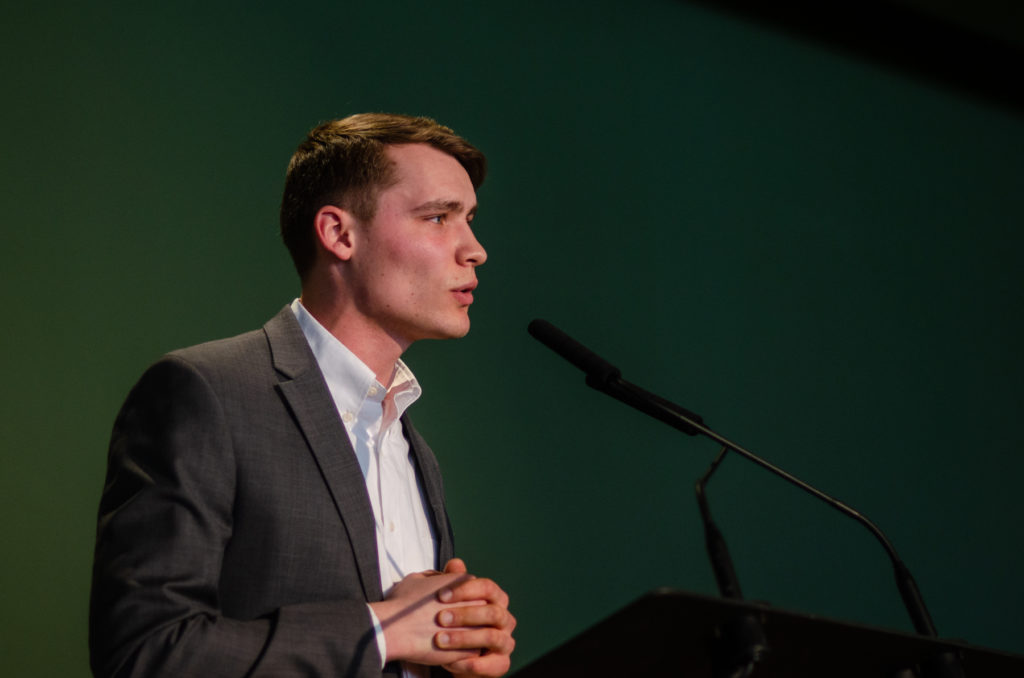
Candidates also responded to a question for the audience that asked about how they would ensure they have a large enough sample size to represent what students want.
Hu focused on minorities, saying he wants to change the structure to encourage minorities to get involved.
Konrad said it’s important to reach out to all demographics. Using an open-source platform, he said, is troublesome because people won’t engage with them. Instead, he suggested interacting with faculty associations and department associations, which often have many demographics within them.
“I think, in that way, I will be able to connect with many different people,” he said.
— Kate Turner
Is the SU referendum the Sustainability and Capital Fund, or the Capital and Sustainability Fund?
Current vice-president (external) Adam Brown represented the referendum to create a new $25 fee charged to students per semester to alleviate sustainability and deferred maintenance in the Students’ Union Building.
One question asked why in campaign materials only 20 per cent of the breakdown of fund usage actively mentions sustainability projects.
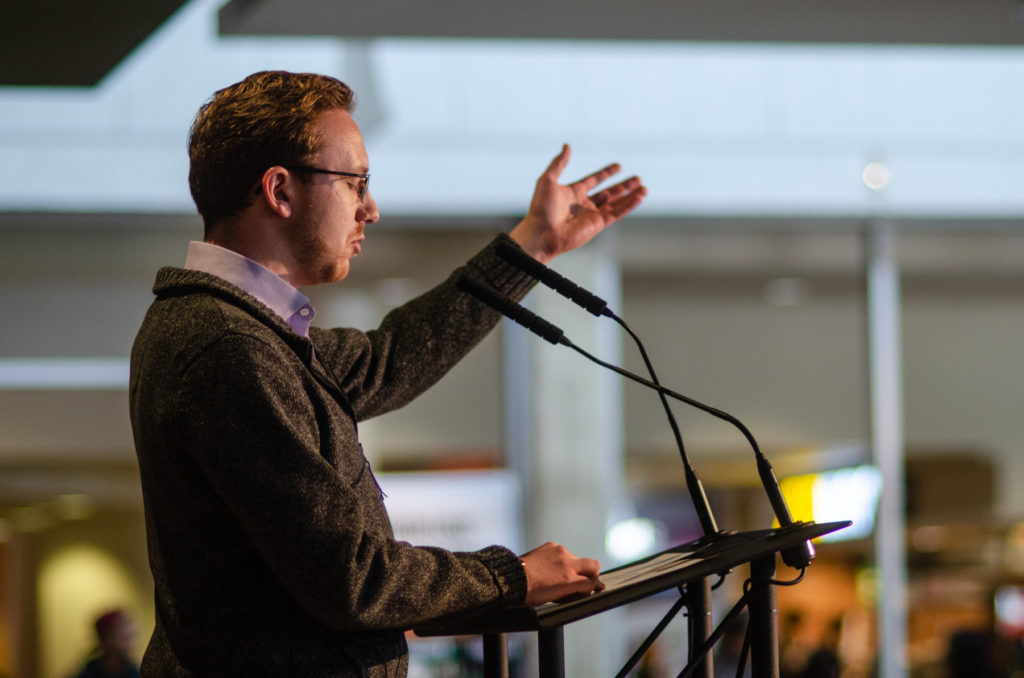
Brown responded that every single project undertaken will have a lens sustainability attached to it.
“It is important to clarify that,” Brown said. “With this fund, every single project that is covered must have a sustainability lens on it whether it be economic, social or environmental. It might not be specifically stated in the name of that or portions of what this fund is made up of.”
“It is called the Sustainability and Capital Fund because our capital — which is our building, our infrastructure — must be tied into sustainability going forward if we want to make SUB carbon neutral by 2050.”
— Seyitan Olaifa
CORRECTION 7:23 p.m. February 26: The article used to read that Chen accused Statt of voting in favour of wage increases for executives through the executive compensation package. However, the executive compensation package did not propose any wage increases. The article now has a sentence clarifying the package did not have any wage increases for executives. The Gateway regrets the error.




